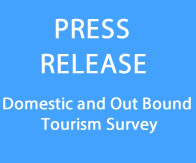
Related Press Release

Tourism now plays an integral role in the global economy. According to the United Nations World Tourism Organization, the sector in 2019 generated USD 1.7 trillion in revenues and employed one out of every 10 workers globally. Although the ensuing year (2020) saw a decline owing to the Covid-19 pandemic the subsequent years 2021 and 2022 have witnessed a strong rebound. The developmental ability of tourism has not been lost on governments as they continue to invest in exploring ways to optimize benefits from their existing tourism resources with a view of enhancing their economic fortunes. Tourism when properly planned and developed can be used as a vehicle to achieve many of the sustainable development goals directly and indirectly. For example, tourism has been empirically known to contribute to poverty reduction (SDG1), reduced hunger (SDG2), created decent work and economic growth (SDG8), and contributed to conserving the environment and sustainability (SDGs 11 &13). Tourism like any other economic sector, is heavily reliant on the availability of rich data that will inform monitoring as well as policy making. In Ghana, various governments over the years have committed resources to developing the country’s tourism potential. However, these efforts are difficult to monitor because the country lacks reliable, accurate and timely domestic and outbound tourism statistical information on key aspects of tourism. Concerns have variously been raised about the validity of the existing data as well as the actual importance of tourism to the Gross Domestic Product. As government seeks to implement its existing 15-year Tourism Development Plan (2013-2027) and other policy documents, the need for a reliable and vibrant data base is imperative. It is to this end that Ghana Statistical Service is conducting a total of four surveys primarily aimed at compiling the Tourism Satellite Account (TSA) which will serve as a basis for computing the sector’s true relevance to the national economy. The four surveys; The Ghana International Travellers’ Survey (GITS), Domestic and Outbound Tourism Survey (DOTS), Accommodation Units Survey (AUS), and Tourism Supply Establishment Survey (TSES) are critical components in computing the TSA and will be undertaken over a three –year period. The GITS which is a year-long survey commenced in 2022 is mainly intended to obtain inbound tourism expenditure to develop Tourism Satellite Accounts (TSA) for Ghana. The main objective of the Accommodation Units Survey (AUS) is to measure the level of supply and demand for commercial accommodation facilities in Ghana and the TSES is envisioned to provide benchmark data on the revenue of tourism establishments to compute the Tourism Satellite Account (TSA) for the country. Both the AUS and TSES shall commence in the last quarter of 2023. The current survey being launched, the DOTS is a national survey which is designed to obtain domestic and outbound tourism data that will lead to the computation of the TSA. Preparatory activities for the DOTS commenced in May 2022. The final preparatory activity (i.e) the listing of structures to select the required households was completed in early April, 2023. To enhance quality, field officers after the listing exercise are being retrained for deployment for the first round of data collection. Teams from GSS will cover the entire country seeking the aforementioned data. It is worth mentioning also that the surveys will also collect ‘non-economic’ data such as measuring of service quality, the tourist experience as well as the state of development of the country’s tourism attractions and infrastructure. Combined with the economic data, these will provide useful information to policy makers on the development of tourism. GSS therefore kindly requests all residents to participate willingly in the exercise to help compute the true contribution of the tourism industry to the national economy.